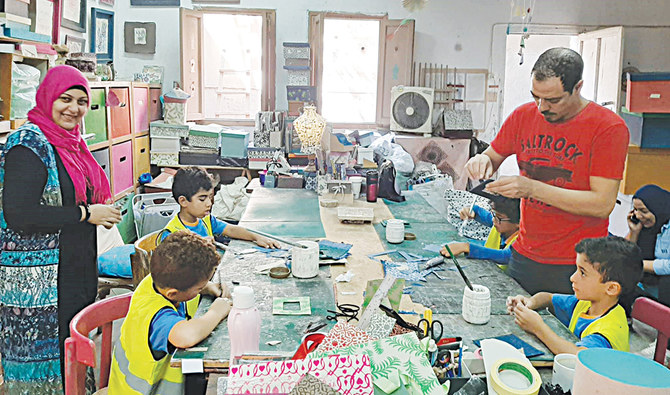
- ARAB NEWS
- 13 Jul 2025

CAIRO: The sustainable disposal of agricultural waste has long been a challenge in Egypt.
Despite a 2012 government ban on burning rice straw at the end of the harvest, every year thick black clouds choke the nation’s skies as farmers set their waste ablaze.
An estimated 22–26 million dry tons of agricultural waste in Egypt is burned annually, according to figures from the American University of Cairo.
As well as being burned in fields, agricultural waste is often used as fuel in primitive ovens that can cause health problems and damage the environment.
The type and quantity of agricultural waste in Egypt differs from year to year and village to village because farmers cultivate whichever crops are the most profitable at any time.
The five crops with the highest amount of waste are rice, corn, wheat, cotton and sugarcane.
In the past decade, government and civil focus has turned towards reducing agricultural waste, but much more needs to be done.
Enas Khamis, one of Cairo’s leading anti-waste activists, was ahead of her time when she set up El Nafeza, a waste reduction workshop, in 2007.
“The disposal of agricultural waste plays a big role in the pollution of our Egyptian skies. Yet a lot of the wastage can be recycled,” Khamis said.
Her social enterprise turns the huge amounts of dumped rice straw into a resource for both humanity and the environment. The workshop also trains and hires people with disabilities to recycle rice straws into paper products that are sold all over the country.
Proceeds from selling El Nafeza crafts are used to run further workshops for young people, women and people with disabilities, teaching them how to use papermaking skills to create products from agricultural refuse.
“It’s important that we empower these groups and teach them a craft that enables them to live in dignity,” says Khamis.
El Nafeza has established specialized training centers to teach and spread art techniques —especially skills working with rice straws, Nile water lilies and bananas stalks.
“The handmade paper industry is considered a non-traditional source of income in poor areas and the development of these crafts will help to solve the unemployment problem in Egypt,” said Khamis.
The El Nafeza workshop in Cairo produces more than 150 handmade products, including paper, envelopes, notebooks, handcrafted cards and frames.
Khamis relies on this workshop to act as a marketing tool for the brand, which sells to both locals and tourists.
“It is easy to sell our products from there because it is better for the customer to see the steps of our work in detail. They can see what a distinctive product it is and how much craftsmanship goes into it,” she said.
Khamis is busy working on a business and marketing strategy to take her wares into the international arena.
“We have plans to export our products to many countries, such as Germany, Italy and the US.
“We already have beautiful and unique products which we will continue to improve. Now our biggest challenge is selling our products and opening up our markets,” she said.
This report is being published by Arab News as a partner of the Middle East Exchange, which was launched by the Mohammed bin Rashid Al Maktoum Global Initiatives and the Bill and Melinda Gates Foundation to reflect the vision of the UAE prime minister and ruler of Dubai to explore the possibility of changing the status of the Arab region.